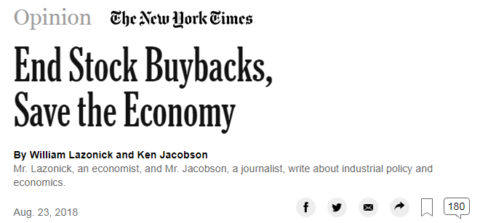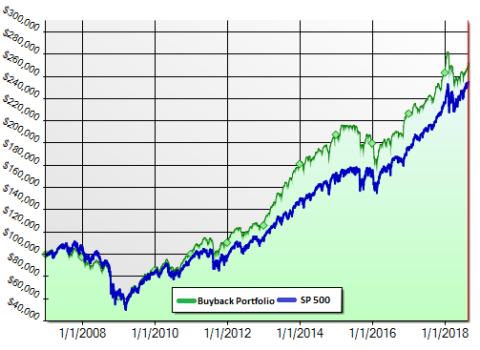Here’s a whopper of an article:

So. Much. Hyperbole.
The basic gist of the article is that the US economy is struggling because of inequality, unstable employment and sagging productivity. And if we eliminate stock buybacks then all will be right in the world. This is misleading at best and very wrong at worst.
First, there’s this assumption that the economy needs to be “saved”. As if the US economy is on the brink of death with its record setting GDP and low unemployment. I fully admit that inequality is a big issue and I think that it makes our economy operate below its potential, but we don’t need to go overboard trying to stoke populist rage with these falsehoods about how healthy the US economy. Yes, it could be better, but it is not on anything close to a deathbed.
Second, I don’t see what buybacks have to do with anything really. The simple fact of the matter is that the public markets are one of the greatest wealth redistribution machines on Earth. Just ask yourself how much more consolidated private wealth would be if we didn’t have public markets? The public markets, through public share issuance, REDUCE inequality by a matter of logic because they democratize the ownership of private corporations.
Now, a share buyback is nothing more than the exact opposite of share issuance. So one might think that a buyback will increase inequality by concentrating ownership into fewer hands. But in fact, we find that companies implementing buybacks tend to perform better than companies that do not perform buybacks.

Therefore, it should be clear that companies buying back shares are contributing more to aggregate household net worth than corporations that do not buyback shares. In a democratized public market this is a good thing as it means that everyone with a savings accounts can own a slice of this publicly available pie.
This argument against buybacks is basically one big fallacy of composition.
In fairness to the authors of this piece, I fully admit that inequality is an issue that we should try to rectify before it gets out of control and public outrage turns into a populist nightmare. It sure would be swell if corporations took all of their profits and just gave them over to their employees. But that’s not how capitalism works. And so, if we are concerned that capitalism is veering too far in the unequal direction of capitalists then it is the government’s responsibility to enact logical tax legislation that combats this problem.
For instance, I’ve stated in the past that there is very little logic for the taxation of secondary market dividends and capital gains at favorable rates because they are not actual “investment”. This is a much more precise tool for fighting inequality. But banning corporations from being allowed to repurchase the very instruments that they issued in the first place is a sub-optimal way to combat this problem and appears to be based on a flawed fallacy of composition.
Mr. Roche is the Founder and Chief Investment Officer of Discipline Funds.Discipline Funds is a low fee financial advisory firm with a focus on helping people be more disciplined with their finances.
He is also the author of Pragmatic Capitalism: What Every Investor Needs to Understand About Money and Finance, Understanding the Modern Monetary System and Understanding Modern Portfolio Construction.

